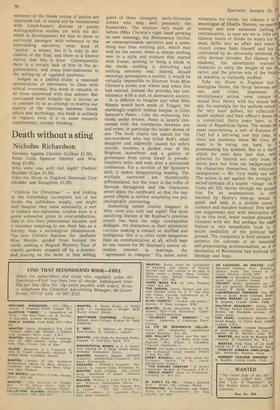Death without a sting
Nicholas Richardson
Nemesis Agatha Christie (Collins £1.50). Panic Colin Spencer (Secker and War. burg £1.90).
Who were you with last night? Frederic Raphael (Cape £1.50).
Take my Drum to England Desmond Cory (Hodder and Stoughton £1.50).
"Christie for Christmas" — and looking at the formidably incomplete list of her books the publishers supply, one might well imagine they came seasonally, a sort of literary neo-lapinisme, notable even in a genre somewhat given to over-production. Add to this their phenomenal success, and it becomes tempting to see them less as a literary than a sociological phenomenon. The new Christie features the ineffable Miss Marple, guided from beyond the tomb, making a Magical Mystery Tour of stately gardens, stopped off by a murder, and staying as the more or less willing guest of three strangely early-Girtonian sisters who may well personify the Eumenides. The mixture very much as before (Miss Christie's right hand growing no new cunning), the Biedermeier thriller, an unexceptionable narrative and a something less than exciting plot, which may well be the secret: there is almost nothing new in a style and mixture that started with Evans; nothing to bring a blush to the cheek; nothing is disturbing and nothing remotely real. Indeed, should sociology presuppose a society, it would be virtually impossible to discover from Miss Christie's books just where and when this had existed. Instead she provides her constituency with a sort of alternative society.
It is difficult to imagine just what Miss Marple would have made of Trigger, the alarmingly explicit lesbian burglar in Colin Spencer's Panic. Like the remaining two books under review, Panic is largely concerned with the correlation between sex and crime, in particular the wilder shores of sex. The book charts the search for the sex-murderer who has killed Rod's small daughter and indirectly caused his wife's suicide, involves a guided tour of the Brighton waterfront and a gallery of grotesques from circus dwarf to pseudoSouthern belle, and ends with a protracted confession. For a novelist of Mr Spencer's skill, it makes disappointing reading. The multiple narrators are theoretically differentiated, but the voice is the vorce of Spencer throughout and the characters never leave the cardboard, so that the supposed climax is neither surprising nor psychologically convincing.
Something rather similar happens to Who were you with last night? The most satisfying feature of Mr Raphael's previous novels has been the edgy contrapuntal dialogue, the characters in their existential cocoons making a contact so muffled and ambiguous that it is often more dangerous than no communication at all, which may be one reason for Mr Raphael's almost obsessive interest in marriage, the " agreement to coaspire." His latest novel
:3 reiterates the theme, but reduces it to monologue of Charlie Hanson, ex-merchal seaman and now salesman (selling centralisation, so near are we to 1984 noi Hanson wants or thinks he wants his VIrli dead, drifts into an affair and when t crunch comes finds himself and his p, confronted by an ominously inhibited, pali sibly deviant intruder. But Hanson is tc'T shadowy, too uncertainly realised S character to carry the weight of the tlaJs rative, and the precise role of the Priapq ex machina is curiously muffled. .n Take my Drum to England has t r analogous theme, the tie-up between osis and crime, impotence 0 c revolutionary action, even torture 0 i sexual love. Henry with his sexual hanf c ups, his nostalgia for the uniform whichli the very least defines, his collection c‘ model soldiers and Nazi officer's dress Of r is committed, thirty years later, to tb s. cause of Republican Spain. The model 1' f seem unpromising, a sort of Enfance d'u Chef but a left-wing one this time, 0 there are moments when Mr Cory doe ( seem to be trying too hard, to b promenading his symbols. But in a thrille which for once does just that, will( 1 achieves its tension not only from '10' / rative pace but from the background 0 1 the characters themselves, the criticism I unimportant — Mr. Cory really can write ; The action is set against the lovingly dl sected dystopia of a tourist 'village on tb Costa del Sol, moves through the prepar$ tion for an assassination, is crop hatched by Henry's Stop-go sexual an guish, and ends in a notable scene ° violence and macabre humour. Few writer can supplement plot with descriptive abit ity on this level, fewer sustain genuine e% citement with wit. But perhaps the odde5 feature in this remarkable book is t,11' entire credibility of the political bac14 ground. The conspiracy is both sinister afl pathetic, the outcome of an essential self-perpetuating professionalism, as if tl mechanics of Revolution had outlived bot' ideology and hope.










































 Previous page
Previous page